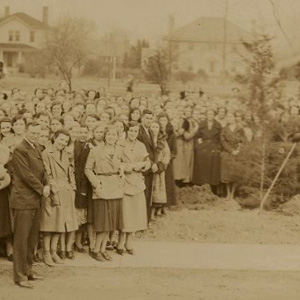
In addition to Robert E. Lee, the Training School also celebrated George Washington’s birthday. But rather than focus on the man and his character, the Washington birthday celebrations were variations of the 1911 “colonial entertainment” and the 1914 “Colonial Pageant” that Sallie Joyner Davis had organized. However, in her discussions of those earlier events, Davis did not mention Washington’s birthday. Nevertheless, as of 1915, a new tradition was declared if not invented: an annual colonial pageant, tracing back to 1911, was deemed the school’s celebration of Washington’s birth. Subsequent Washington celebrations, dating from 1915-1919, appeared in tandem with WWI and heightened American nationalism. The glorification of Washington and colonial life were also veiled expressions of white supremacy, celebrating genteel antebellum Southern culture under the guise of colonial history. At the very least, they were an entertaining and educational way of engaging history, affirming national identity, and remembering national heroes.
The 1915 Training School Quarterly arguably invented this tradition by declaring that an “annual historical pageant on George Washington’s birthday” dated back to the 1911 colonial entertainment at the school. It added that “each year the idea has grown.” However, the purpose of this analysis of the school’s past was to extoll the 1915 celebration as the grandest yet, linked unmistakably to the founding father of the country, George Washington. The 1915 “historical pageant” was described in glowing terms as having involved three classes at ECTTS, one class of Model School students, and a total of 197 people, covering the first 300 years of American history. The pageant followed the script of “A Colonial Pageant” presented in Esther Bates’ Pageants and Pageantry. Unlike Davis, however, the 1915 Quarterly did not mention Bates’ book. Also, the 1915 pageant, unlike Davis’ pageant from the year before, did not include events from North Carolina history. And, other than being set in the colonial and revolutionary periods, the 1915 pageant had little to do with Washington.
In 1916, the one-year professional class corrected this by celebrating Washington’s birthday with a costumed dramatization of his life including moments such as his “cutting down the cherry tree,” “killing the sorrel colt,” “election … as commander in chief of the Continental Army,” “making of the flag by Betsy Ross,” etc. The stated purpose of this more modest performance was “to show the possibilities of dramatization in any school, with very little time and expense.” The one-year professional class noted that “the lives of Raleigh, Lee, Columbus, and many others can be used in the same way.” The 1916 celebration’s focus of Washington the military commander no doubt reflected the rise of American nationalism and increasing readiness to enter WWI on behalf of the allied cause.
In 1919, the Edgar Allan Poe literary society assumed responsibility for staging the celebration. By this point, the “colonial pageant” had become, more simply, a “colonial evening.” The costumed performance featured a glorious episode from Washington’s time as commander of the Continental Army: his army crossing the Delaware and the subsequent defeat of the Hessian forces at Trenton. “Patriotic songs” and a “beautiful” minuet performance added to the event. A “fairly good crowd” attended, despite “bad weather.” The evening’s focus on Washington’s victory over Hessian troops echoed the conclusion of WWI in late 1918: Allied (including the U.S. as of 1917) defeat of Germany. Yet with the war over, much of the patriotic energy behind the Washington events subsided. While continued in various forms, especially in local schools influenced by anything that the Training School did, Washington celebrations on campus were more muted in the years ahead.
Sources
- “All Ready for Colonial Evening Training School.” Greenville News. February 22, 1919. P. 1.
- Bates, Esther Willard. Pageants and Pageantry. Boston: Ginn and Company, 1912.
- “Colonial Evening Given by Poe Literary Society Enjoyed.” Greenville News. February 24, 1919. P. 1.
- “Colonial Evening Training School Saturday Night.” Greenville News. February 20, 1919. P. 1.
- “Dramatization of Washington’s Life.” Training School Quarterly. Vol. 2, no. 4. January, February, March, 1916. Pp. 296-298.
- Davis, Sallie Joyner. “The Use of Pageants in Schools.” Training School Quarterly. Vol. 1, no. 3. October, November, December, 1914. Pp. 132-135.
- “The Pageant on Washington’s Birthday.” Training School Quarterly. Vol. 1, no. 4. January, February, March, 1915. Pp. 270-271.
Citation Information
Title: George Washington's Birthday
Author: John A. Tucker, PhD
Date of Publication: 7/18/2019